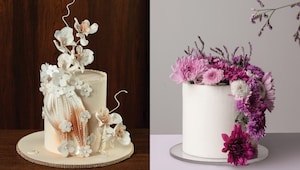Is it high time we stop confusing feminism for hating men?
Because somewhere along the way, feminism got twisted into misandry, forcing people to believe that having a boyfriend or a husband is embarrassing.

Yes, I am a feminist. No, I do not hate men.
It’s funny how, in 2025, being a feminist has somehow become synonymous with hating men. The one thing that was supposed to be ours—a movement that stood for equality and respect—has now been twisted into a narrative that pits women against men. But how did we even get here?
I recently came across an article online that made a bold statement about how having a boyfriend is now “embarrassing.” If your first reaction was, “What even?”, you’re not alone. Apparently, in 2025, dating or being in a relationship is considered cringe. The piece spoke about content creators who went from posting fun, relatable solo-girl content to featuring their boyfriends, and how that supposedly ruined their appeal.
But here’s the thing: if you don’t like that content, just don’t watch it. It really is that simple. People have somehow forgotten that they have the option of just opting out of what doesn’t resonate with them. Instead, everyone has become a hypercritical spectator demanding that the world adjust to their preferences. And maybe that’s part of the problem—this culture of “icks” and internet cynicism is what’s making feminism look like a rejection of men altogether. And now, for some reason, having a boyfriend or a male partner is now seen as weak, a poor life choice, even. People today, women especially, often wonder, “Why would she date a man when she could focus on her career, travel the world, or live on her own terms?” But why do we think it can only be one without the other?
I was having a light-hearted conversation about this with a friend, and she joked about "What do they expect heteronormative women to do? They want to be loved and cared for, and cherished. Why should it take away from their identity?" And I couldn't agree more. Feminism was never about rejecting men. It was about freedom. Over a century ago, women were expected to be subservient to men: homemakers, caretakers, and objects of desire. We fought long and hard to break that mould, to be seen as equals and treated with respect. The ultimate goal wasn’t to swing to the other extreme. All we wanted was to be free to make our own choices, whether that was choosing to only be someone’s partner or a working woman who may or may not also be someone’s partner—it’s still her ‘choice’.
So why are women still subject to public humiliation for willingly choosing to be with someone?
But that’s not even the part that bothers me the most—though it probably should. What’s really frustrating is how social media (and society, to an extent) has managed to warp the idea of feminism into something it’s not. Somehow, being a feminist has become shorthand for “man-hater.” I came across a video a while ago, where the interviewer asked random men on the street what the biggest red flag in women today is, and they responded with, “If she’s a feminist.” The irony? Most of these men proudly admitted to not being feminists, and when asked what they were if not feminists, some of these same men replied, “The opposite”—essentially admitting to being misogynists without even realising it.
But why has feminism become such a red flag? A lot of men see it as a loss of control, a demand to give up power, while some women view it as a label to tiptoe around—something they secretly believe in but hesitate to say out loud, worried it might make them sound angry or “too much.”
Somewhere along the way, (some) women started distancing themselves from the word. “I’m not a feminist” has become a way to seem more agreeable, less confrontational—as if believing in equality automatically means you’re against men. It’s seen as a problem, as if feminism is a rebellion rather than a request for respect. At least that's how actor Nora Fatehi put it in an interview. The actor spoke at length about how “feminism f****d up our society completely” and that women should be independent, “but to a certain extent.” Naturally, the internet did not take kindly to her opinions, and was quick to point out the irony that a successful woman—whose career is, in part, possible because of the freedom that feminism fought for—would dismiss the very movement that made such progress possible. Some did argue that she had confused feminism with its extreme interpretations, reducing it to a caricature of angry women who reject traditional roles. On the other hand, many women, including celebrities like Kareena Kapoor Khan, Katy Perry, and a few others, speak about not being a feminist but standing for equality and equal rights for both men and women, proving they do not understand the concept at all.
And in case you're unsure too, here's what the internet claims is the best explanation for it by LeAndra Lee Baker: “The patriarchy is a boot on a woman’s neck. Feminism is the request to remove the boot. Male activists believe this request is reverse oppression. Women with internalised misogyny wonder why the other women are complaining. Allies want to explain the situation without offending the boot. Conservatives believe this is the way it’s always been, and things are better this way.”
Again, feminism was never about fighting men; it was about fighting systems that keep both men and women boxed into unfair roles. The word itself has been twisted, stripped of its nuance, and turned into something people feel the need to disclaim. The truth is, we don’t hate men—we need them to be part of the conversation. Because equality doesn’t work if half the world sits it out. We need men to listen, to question, to unlearn. To understand that the point was never to replace one form of dominance with another, but to level the field so that no one has to shrink to make room for someone else.
The sad part is that somewhere along the way, feminism became performative. It’s now something you post, hashtag, or wear on a T-shirt—often without understanding what it really means. The internet loves a good aesthetic, and feminism became one too. But when everything turns into a trend, the real message gets lost. Conversations about equal pay, safety, respect, and choice are drowned out by catchy slogans and viral outrage. So when people say they don’t relate to feminism anymore, maybe it’s because they’re seeing its loudest, flashiest version online instead of the everyday one that quietly asks for fairness.
At its core, feminism was always about freedom—about giving everyone, regardless of gender, the right to choose who they want to be and how they want to live. It’s not about hating men or rejecting love or wanting control. It’s about wanting balance. And maybe it’s time we stopped treating feminism like a dirty word and started remembering what it really stood for in the first place: respect and equality.
Lead image: IMDb
Also read: Are financially independent women making insecure men uncomfortable?
Also read: Cinema is done silencing female rage—now it’s putting it front and centre
more from Life

Is Gen Z going analogue amid an epidemic of disconnection?

Inside the rise of impossible-to-ignore cakes and the bakers making them worth the splurge

Suvir Saran would like you to clean your glasses

This Valentine’s Day, skip the reservations and cook up romance instead with TTK Prestige

Genius hack or pathway to loneliness? The dawn of dating’s spreadsheet era

I tried Pantene's Bond Repair Conditioner and here’s what it changed about my styling routine

Low-rise jeans are squeezing back into fashion—here’s how to wear them in 2026

I travel for a living—these are the top 15 tips I've learned to avoid skin freak-outs and overweight luggage

All the hottest beauty finds that make us sit up and take notice

Will we ever stop hating it when women propose to men?
